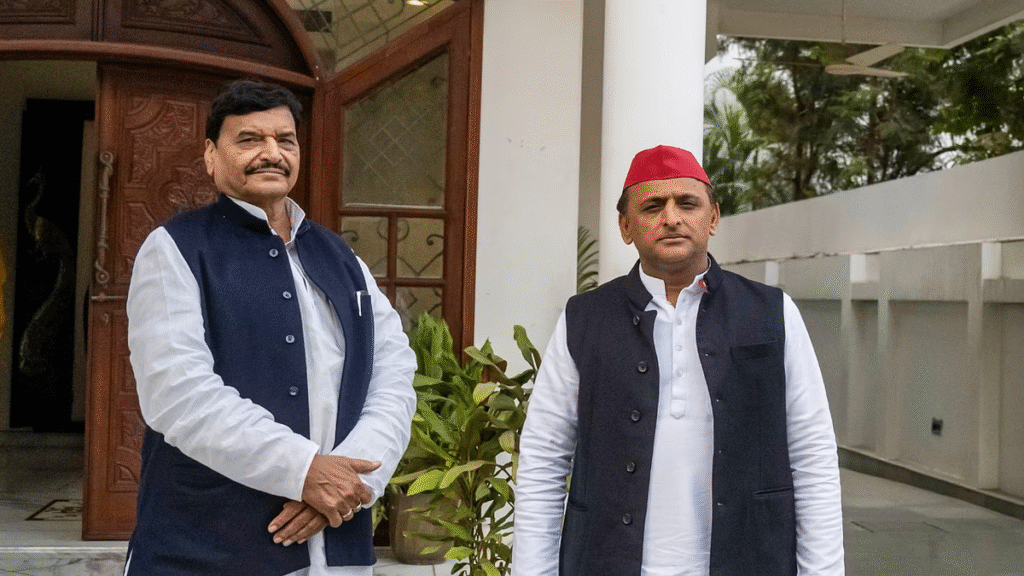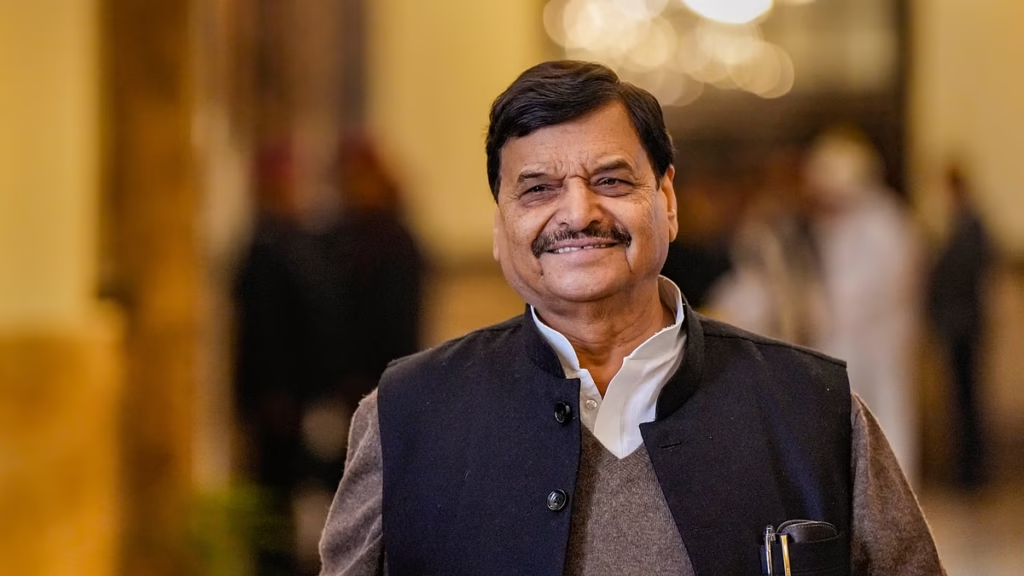
In a state as politically dynamic and populous as Uttar Pradesh, issues of governance, law, and order are always at the forefront of public discourse. Recently, senior Samajwadi Party (SP) leader Shivpal Yadav offered a candid critique of the state government’s flagship security initiative—Operation Sindoor. Labeling it as a “mere show,” Shivpal’s remarks have reverberated across political and social arenas, raising profound questions about the effectiveness of government policies, the role of security agencies, and the real challenges faced by the citizens on the ground. His statements present a rare glimpse into the fissures within the political landscape and the pressing realities overshadowed by political rhetoric.
This detailed analysis explores the multiple layers of this discourse, examining Shivpal Yadav’s critique in the larger context of Uttar Pradesh’s law and order scenario, political dynamics, and the expectations of millions of residents who seek peace and security amid growing concerns.
Operation Sindoor: The Promise and the Public Perception
Operation Sindoor was launched amid significant public and political expectations. The Uttar Pradesh government, led by the ruling party, positioned the initiative as a comprehensive effort to curb crime, target anti-social elements, and restore confidence in the security apparatus. Announced with much media coverage and official endorsements, the operation promised swift action against offenders, visible law enforcement presence, and a crackdown on illegal activities.
However, from the onset, there were murmurs of skepticism among opposition leaders and civic activists. Critics argued that Operation Sindoor appeared more like a carefully choreographed campaign aimed at political gain rather than a sustainable, strategic policing reform.
Shivpal Yadav’s recent condemnation of the operation as “dikhawa” or a mere “show” captures this skepticism vividly. He contends that while the government projects an image of control and success, the lived experiences of many citizens reflect a starkly different reality. Complaints about rising crime rates, inadequate police responsiveness, and a growing sense of insecurity among residents stand in contrast to the government’s optimistic portrayals.
Shivpal Yadav’s Role and Political Credibility
Understanding Shivpal Yadav’s critique requires recognition of his stature and political legacy. A seasoned politician with decades of experience, Shivpal holds considerable influence within the Samajwadi Party and the broader political arena of Uttar Pradesh. His insights stem not only from his political alignment but also from his deep understanding of the socio-political fabric of the state.
Known for his straightforwardness and willingness to speak his mind, Shivpal’s comments carry weight because they often reflect nuanced ground realities beyond party lines. Unlike many politicians who stick to party scripts, his observations tend to bridge the gap between political discourse and citizen concerns.
His pointed questions about security agencies reveal a critical dimension of governance — the effectiveness and accountability of institutions tasked with maintaining law and order. His emphasis on this aspect invites a broader discussion on institutional reforms and public administration.
Law and Order in Uttar Pradesh: A Complex Challenge
Uttar Pradesh, India’s most populous state, has long grappled with complex law and order challenges. Rapid urbanization, socio-economic disparities, communal tensions, and political rivalries have contributed to a volatile security environment. Crime rates, including violent crimes and organized illegal activities, have been a persistent concern.
The state’s police force, responsible for enforcing law and maintaining peace, faces multiple systemic issues, including understaffing, inadequate training, political interference, and resource constraints. These factors often undermine its ability to respond effectively to crimes and ensure public safety.
Against this backdrop, government initiatives like Operation Sindoor are conceived as solutions to improve policing and curb crime. Yet, the effectiveness of such operations depends heavily on genuine administrative will, capacity building, and community involvement.
Shivpal Yadav’s critique that the ground reality does not match the show of Operation Sindoor reflects the frustration many feel about the persistent gap between policy announcements and real change on the streets.
The Disconnect Between Political Narratives and Citizen Experiences
One of the most striking aspects of Shivpal Yadav’s statement is the emphasis on the disconnect between the government’s portrayal of success and the everyday realities faced by the public. This disconnect is not unique to Uttar Pradesh but is emblematic of governance challenges where political communication often overshadows practical outcomes.
Citizens frequently report feeling unsafe despite official claims of crime reduction and enhanced security. Incidents of crime, especially in rural and semi-urban areas, sometimes go unreported due to lack of faith in police efficacy or fear of retaliation. The media often highlights high-profile cases that reveal flaws in the system, reinforcing public anxiety.
The phenomenon where the state projects a polished image while ground-level problems persist is sometimes referred to as the “performance trap” in governance. This trap can lead to disillusionment among voters and weaken the social contract between the government and the governed.
Shivpal Yadav’s use of the word “dikhawa” resonates deeply in this context, capturing public sentiment that questions the authenticity of government campaigns.
Examining the Performance of Security Agencies
Shivpal’s criticism also directly addresses the role of security agencies, pointing to shortcomings that hinder their effectiveness. Security agencies encompass police forces, intelligence units, and other law enforcement bodies responsible for ensuring public safety.
Several challenges confront these agencies in Uttar Pradesh:
- Political Pressure: Security agencies often face undue political influence, which can compromise their impartiality and operational efficiency. Officers may be pressured to prioritize political interests over justice and law enforcement.
- Resource Constraints: Many police stations lack modern infrastructure, technology, and adequate personnel, limiting their capacity to investigate crimes promptly or maintain a visible deterrent.
- Training and Professionalism: Continuous professional development is crucial for modern policing. However, many officers lack training in community policing, cybercrime, forensic investigation, and conflict resolution.
- Corruption and Accountability: Corruption within the system erodes public trust. Weak mechanisms for accountability allow malpractices to persist, reducing the agencies’ credibility.
- Community Relations: Historically, there has been a trust deficit between law enforcement and certain communities. Building positive relationships is essential to effective policing.
Shivpal Yadav’s remarks bring these issues into sharp relief, calling for introspection and systemic reform rather than cosmetic operations.
Political Dynamics Surrounding Law and Order
Law and order is not just an administrative issue in Uttar Pradesh; it is intensely political. Political parties often use crime statistics and safety concerns as campaign tools, blaming rivals for failures while claiming credit for improvements.
Shivpal Yadav’s critique must be seen in the context of political rivalries and intra-party dynamics. As a senior SP leader, his statements can be interpreted as both a critique of the ruling party’s governance and a call to his own party to address law and order more effectively.
Moreover, his candid tone could signal internal differences within the SP, highlighting debates over strategy and messaging. Such intra-party discussions are common ahead of elections when security remains a key voter concern.
The ruling party, on its part, tends to highlight achievements through media campaigns showcasing arrests, recoveries, and crime prevention efforts under initiatives like Operation Sindoor. Yet, opposition voices like Shivpal’s serve as reminders that numbers and headlines don’t always translate into felt security for the average citizen.
Socio-Economic Factors Influencing Security
To understand the law and order situation in Uttar Pradesh, one must also consider the socio-economic factors that influence crime and security dynamics. High poverty rates, unemployment, educational disparities, and social marginalization contribute to vulnerabilities that can foster crime.
Regions with limited access to basic amenities often experience higher crime rates due to lack of opportunities and weak social institutions. This creates a cycle where insecurity hampers development and vice versa.
Addressing security challenges thus requires integrated policies that go beyond policing to include social welfare, economic development, education, and community empowerment.
Shivpal Yadav’s emphasis on “ground reality” implicitly calls attention to these underlying issues that government operations must address if they are to be truly effective.
Community Engagement: The Missing Link
One area where many law enforcement initiatives fall short is meaningful community engagement. Policing cannot succeed solely through crackdowns and arrests; it must build trust and partnerships with local populations.
Community policing models that involve residents in identifying issues, collaborating on solutions, and fostering mutual respect have been successful in many parts of the world. Unfortunately, such approaches are often underutilized in Uttar Pradesh.
Shivpal’s critique, by highlighting the operation’s superficial nature, points indirectly to the lack of sustained, grassroots involvement that could make law enforcement more responsive and accountable.
Investing in community relations can reduce crime, improve reporting, and create safer neighborhoods. It is a vital component missing from many high-profile policing drives.
Media’s Role in Shaping Perceptions and Accountability
The media wields considerable influence in shaping public perception about security operations like Operation Sindoor. Balanced journalism can highlight successes and failures, hold authorities accountable, and give voice to citizens’ concerns.
In Uttar Pradesh, media coverage often oscillates between celebratory reporting of police actions and exposés of law enforcement failures. This duality reflects the complex reality but can also confuse or polarize public opinion.
Shivpal Yadav’s statements themselves have become media focal points, generating debate and scrutiny. Such discussions are healthy in a democracy as they encourage transparency and public engagement.
However, sensationalism and politicization must be avoided to ensure that discourse remains constructive and solutions-focused.
The Voter’s Perspective: Security as a Key Election Issue
As Uttar Pradesh prepares for upcoming elections, security remains a critical issue influencing voter behavior. Crime and safety concerns weigh heavily on the electorate, who seek reassurance from political parties that their lives and property will be protected.
Shivpal Yadav’s critique could thus be seen as a strategic move to align his party’s narrative with voter anxieties, pressing the ruling party on its record and demanding accountability.
Political promises often flood electoral campaigns, but voters increasingly demand tangible results. Failure to address real security concerns can cost parties electoral support.
This dynamic places additional pressure on governments to move beyond symbolic operations like Sindoor toward substantive reform and citizen-centric policies.
Learning from Other States and Best Practices
Uttar Pradesh can also benefit from studying successful models of policing and security from other Indian states and countries. States like Kerala and Tamil Nadu, known for relatively better law and order records, have invested heavily in police modernization, community engagement, and use of technology.
Incorporating best practices such as integrated crime databases, rapid response systems, and transparent complaint mechanisms can enhance effectiveness.
Shivpal Yadav’s critique invites policymakers to look beyond slogans and learn from proven approaches to governance and policing.
The Way Forward: A Call for Genuine Reform
The debate sparked by Shivpal Yadav’s comments about Operation Sindoor opens a broader conversation on governance, accountability, and citizen safety in Uttar Pradesh. It calls for urgent and genuine reforms that address the root causes of insecurity rather than relying on temporary shows.
Key steps for progress include:
- Strengthening institutional independence and reducing political interference in law enforcement.
- Increasing investments in training, infrastructure, and technology.
- Promoting transparency through public reporting and independent oversight.
- Enhancing community policing and citizen participation.
- Addressing socio-economic inequalities that underpin crime.
- Fostering a political culture focused on service and results over optics.
Conclusion: From Political Show to Real Security
Uttar Pradesh stands at a crossroads where the choice between superficial displays and substantive action will shape its future trajectory. Senior leaders like Shivpal Yadav remind us that governance is not about theatrical operations but about making citizens feel safe, respected, and valued.
Operation Sindoor’s fate depends on whether it evolves from a political spectacle into a meaningful instrument of justice and order. The voices of experienced politicians, media, and citizens must be heard in this transformation.
Only by bridging the gap between political showmanship and ground reality can Uttar Pradesh hope to fulfill the promise of security and progress for all its people.

